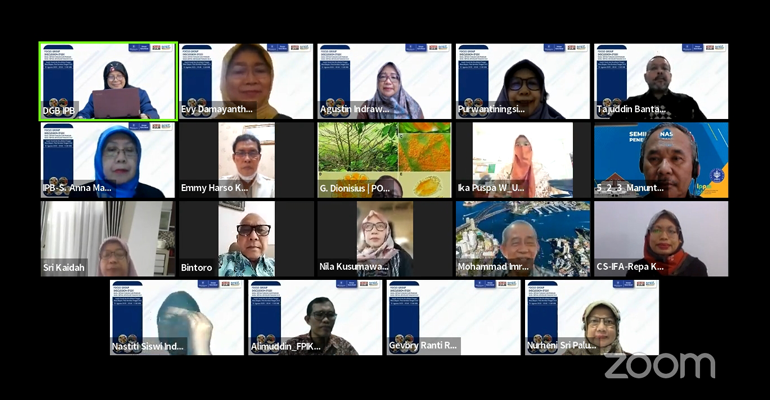IPB University Board of Professors: Unconventional Food Key to Food Revolution 50.0

Unconventional food continues to be a focus for scientists to overcome hunger and climate change. These plant and animal food substitutes are considered to be the key to one of the 50.0 food revolutions. To review this, the Board of Professors (DGB) of IPB University elaborated the map of the 50.0 food revolution from the nutritional and social aspects.
In a focus group discussion (FGD) entitled ‘Social and Health Aspects of Future Food: Map of Food Revolution 50.0’, Prof Sri Anna Marliyati, Professor of IPB University said that scientists have already developed vegetable-based meat substitutes such as peas and soybeans.
“This analog meat has features including better nutritional value, lower cholesterol and fat, more homogeneous and more durable,” she said.
Prof Sri added that besides legumes, non-vegetable-based non-conventional foods such as mushrooms and microalgae need to be considered. Because apart from its special nutritional value, it can also be a functional food.
Prof Nurjanah, Professor of the Faculty of Fisheries and Marine Sciences, at IPB University, also stated that one of these functional foods can be obtained from seaweed. Moreover, brown and red seaweed types have not been optimally utilized. Even though its content is high in fiber and antioxidants.
“Seaweed can have a great potential to be processed into salt that is low in sodium. This salt can reduce the risk of cardiovascular disease due to excessive sodium consumption,” explained Prof Nurjanah.
The halal aspect of non-conventional food was reviewed by Prof Nancy Dewi Yuliana, Professor of IPB University from the Faculty of Agricultural Technology. According to her, the halal aspect of unconventional food products is very important because it is related to its acceptance by the community.
“Unconventional food innovation needs to be analyzed and assessed for its halal status immediately, so that consumers and producers can benefit maximally, considering that Muslim consumers are very potential in terms of numbers,” she said.
Prof Nancy said this effort requires clear and intensive communication between consumers, researchers, scholars, and industry. “Consumers and researchers need to criticize the potential risk of non-halal in every advancement in food technology and proactively communicate with the ulama to find a solution in the form of a fatwa,” she continued.
This fatwa, he said, needs to be socialized to researchers and industry players as a guide in modifying materials or processes so that the halal status is clearer. (MW/Rz) (IAAS/TNY)



